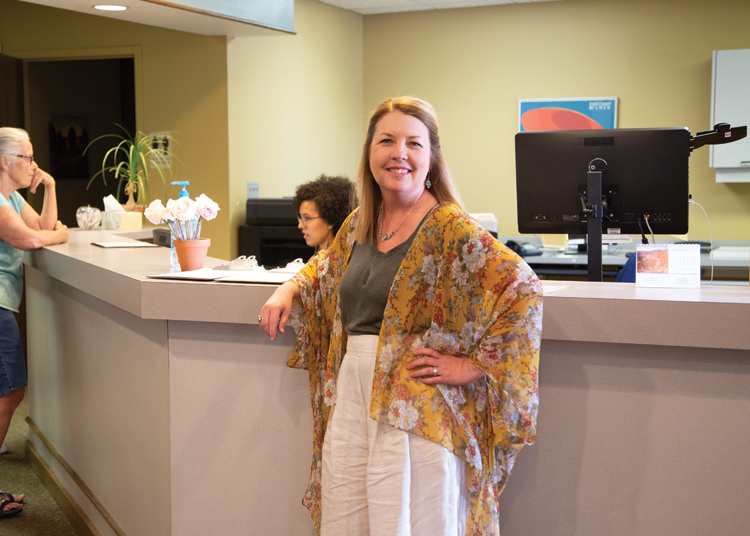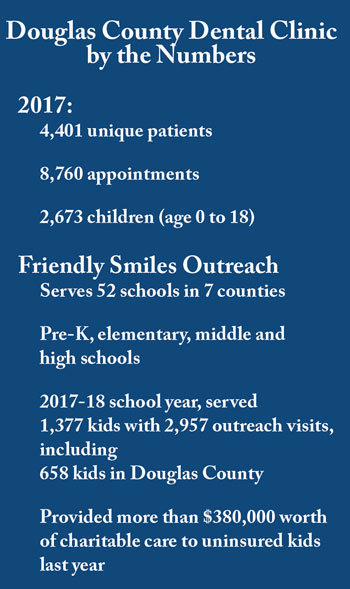Local outreach program offers community members, many of those children, dental care that may otherwise not be available to them.
| 2018 Q3 | story by Emily Mulligan | photos by Steven Hertzog

Molly day, DDS, completing a dental exam on a patient; photo by Johnna Harrison
Local outreach program offers community members, many of those children, dental care that may otherwise not be available to them.
A woman in her 20s stands in the hallway of the Douglas County Dental Clinic looking at her face in the mirror, tears streaming down her cheeks. They are happy tears.
“I haven’t had my teeth cleaned since I was a teenager. I haven’t smiled because I was so embarrassed. Now I can smile,” she says.
An elementary school student has been going to the nurse’s office complaining his mouth hurt. Today, school lunch is pizza, which has soft crust, and he can’t even chew that. On top of his toothache, he now has hunger pain, because it hurts too much to eat. Paying attention in class is impossible.
The nurse refers his family to the Douglas County Dental Clinic, and now he can eat anything he wants to, the pain a distant memory. And, he can focus on his schoolwork.
A thirtysomething man calls in sick to his warehouse job. His jaw is throbbing, and his cheek is swollen. Eating is out of the question, and the pain is so intense, he can’t even think straight. He doesn’t have a dentist, hasn’t seen one in years, so he goes to the hospital emergency room.
The ER staff refers him to the Douglas County Dental Clinic, where he has a root canal. Good thing, too, because the infection from his abscessed tooth could have spread to the rest of his body and made him very ill had he not received dental treatment. Now, he is back at work like nothing happened.
A little girl’s teacher notices a student continually picking at her mouth with an unfolded paper clip. The teacher sends the girl to the nurse’s office. The nurse can see multiple pockets of infection in the girl’s mouth. She calls Mom, who is at work in a call center, and tells her about the Douglas County Dental Clinic. Mom makes an appointment for the little girl for the next day. The school counselor arranges a ride to the clinic so Mom doesn’t have to miss work.
The next week, the girl unexpectedly moves out of town. It might be years until she sees the dentist again, but the infection has cleared, and she has clean teeth and sealants.

Julie Branstrom, director of the Douglas County Dental Clinic.
Shiny, white teeth are not the only gift that dental care delivers. A healthier heart, lower risk for diabetes, fewer headaches and a body free of infection are also results of regular dental care. Being treated by a dentist can even save a person’s life.
Although most patients pay on a sliding scale, many local patients, including hundreds of children, receive dental care for no cost through the Douglas County Dental Clinic, 2210 Yale Rd., and its outreach program, Friendly Smiles.
“We know there is a need for access to dental care. Most people don’t have any kind of dental insurance, and there are limited providers who accept Medicaid, because it’s too hard for private practices to accept the pitifully low reimbursements,” says Julie Branstrom, executive director of the Douglas County Dental Clinic.
The clinic is a full-scale dentist’s office, offering the full scope of dentistry, including X-rays, cleanings, extractions and root canals, to those who meet residency and income requirements, which are to be at or below 200% of the federal poverty level. Patient costs are determined on a sliding scale based on where the patient’s household income is in relation to the federal poverty level. Medicaid patients are also welcome, both adults and children.
Friendly Smiles Dental Outreach Program takes dental services to local schools, where it operates pop-up dental clinics on-site in schools twice per school year. Children who receive free and reduced lunches at school can qualify for free dental services, and others who have a medical card or commercial dental insurance also can be treated in the school clinics. The Friendly Smiles clinics save parents the trouble of making an appointment or transporting their child to the dentist’s office, and the clinics offer cleanings, X-rays and extractions, among other services. All the parents have to do is sign a consent form, and the school and Friendly Smiles take care of the rest.
“We are able to reach a high-need, high-risk population that has so many outside forces in their lives that make it hard to see a dentist. We alleviate that in the schools with Friendly Smiles,” explains Hannah Sheridan-Duque, Friendly Smiles outreach coordinator and office manager for the Douglas County Dental Clinic.

“In the school setting, the kiddos see the same people year to year. Also, their friends are in the chair next to them getting treatment, so that helps them feel more brave and push back their fears,” she says.
With the dental clinic taking place right in the school, the students also miss less class than they would going to the dentist, and the parent doesn’t have to make an appointment, take off work or transport the child to and from, all of which can present challenges to many families.
Friendly Smiles has mobile dentist chairs and transports all of its equipment in suitcases that fit in one of its two vans. A dentist along with three to four hygienists staff the efficient operation, made even more streamlined by all of the paperwork being handled prior to the appointments.
Cordley Elementary, in Lawrence, is one of the 52 schools in seven counties that Friendly Smiles visits each year. Catherine Bolton, Cordley’s mental health support professional, says the benefits of dental care for Cordley students and their families are incalculable.
“Dental day at school is my favorite day in the whole world! Any day we can get 30-plus kids in front of the dentist is a great day. Some of these kids have never been to a dentist before,” Bolton says. “What the clinic staff does is outstanding. They know how to handle those kids’ fears, and they really maintain the kids’ dignity.”
Bolton clears her schedule on Friendly Smiles days, so she can save the dental staff time by retrieving students from class when it’s their turn. That way, as many Cordley students can be seen as possible.
Dental problems in children can manifest themselves in a lot of different ways in the classroom, Bolton explains, including being grumpy and inattentive, and visiting the nurse frequently. “We all know a toothache can really hurt,” she says. “And, most of our students don’t have insurance—it takes a high-level job to have dental insurance.”
Bolton says the ability of the Friendly Smiles program to reach children whose families are wrestling with poverty and homelessness is critical.
“Families in these situations just don’t think about things like, ‘You should brush your teeth,’ or ‘Do you have a toothbrush?’ ” she says. “When they see the dentist at school, everybody gets a bag with a toothbrush and floss, and everything they need to keep it up at home.”
